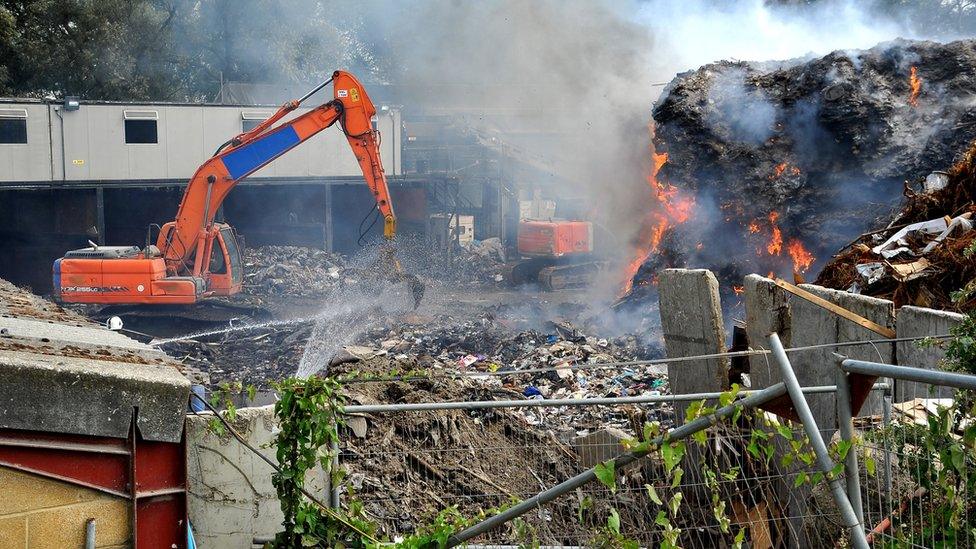Two-month Swindon tip fire was preventable, report finds
- Published

The blaze at Averies Recycling Ltd cost an estimated £500,000 to put out
A fire that burned for 57 days at a waste site in Swindon could have been prevented if the Environment Agency and council had worked together better.
Waste at Averies Recycling Ltd is thought to have caught fire accidentally on 21 July 2014.
A fire at the site the year before had raised issues that were not acted upon.
A scrutiny group has since concluded the 2014 fire was "preventable and avoidable if timely action had been taken and enforcement was effective".
The scrap and recycling site in Marshgate burned from 21 July until 15 September.
'Overloaded site'
Dorset and Wiltshire Fire and Rescue Service said the cause of the fire was "most likely accidental, caused by self-heating or degradation of organic materials within the waste stack".
It cost an estimated £500,000 to put the fire out.
Following the blaze, a group was set up to look at how the relevant local agencies had responded and its report is due to be presented to Swindon council's scrutiny committee on 7 June.
The group found that at the time of the 2014 fire "too much waste" was being stored illegally and "without proper control" at the site.
"The overloading of the site was observable in the previous year and was reported but this did not result in change," the group said.
It said a previous fire at the site could have "led to improvements and reduction of risk" and "exposed the potential fire source" buried under the "overloaded site".
Waste had been stored illegally on the site and cost rather than public safety seemed to be the priority, the report suggested
According to the Local Democracy Reporting Service, the group's report also criticised the way agencies - notably Swindon Borough Council and the Environment Agency - had worked together.
It found the relationship did "not appear to be one of cooperation, but of hierarchy - and this appeared to be a system failure at the time".
"When responding to the fire there were problems with inconsistent representation at meetings, and the lack of delegated authority to act at meetings when decisions needed to be made frustrated the response and delayed some action and extinction of the fire."
It also said that costs "appeared to be the prominent factor at the time" rather than public safety being the priority.
And added that failing to "control the circumstances and adhere to permissions" had resulted in "extraordinary costs".
Follow BBC West on Facebook, external, Twitter, external and Instagram, external. Send your story ideas to: bristol@bbc.co.uk , external
Related topics
- Published2 April 2019
- Published17 January 2015
- Published10 September 2014
- Published16 August 2014
- Published18 September 2014
- Published24 November 2014
- Published2 August 2014